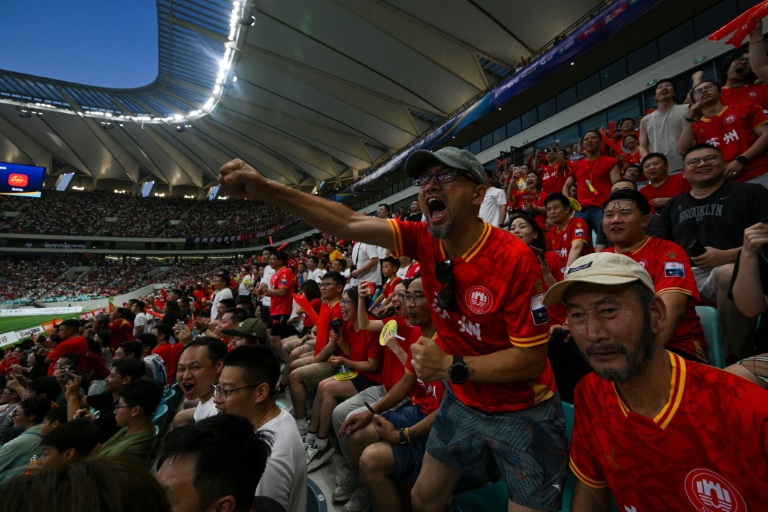
In a vibrant display of enthusiasm for amateur football, approximately 40,000 spectators filled a stadium in Suzhou, China, on a summer day, while thousands more gathered around public screens. This surge in interest reflects a growing trend where amateur leagues are winning over fans disillusioned by the corruption and inefficiencies of professional football in the country. The recent matches, particularly in the Jiangsu province, have attracted millions of online viewers, revitalizing local tourism and fostering friendly rivalries between cities.
The sold-out match in Suzhou showcased the passion of the local crowd, who erupted in cheers when 17-year-old Kou Cheng scored just two minutes into the game against Yangzhou. Many fans sported bright red jerseys emblazoned with the name “Suzhou” and used paper fans to combat the heat. According to Qian Chunyan, a 35-year-old local resident, the atmosphere at these matches is unmatched. She stated, “Compared to other competitions, the fans here are more passionate, and even if they don’t understand football, the atmosphere is lively.”
This amateur football tournament gained traction earlier this year in Jiangsu, quickly becoming a sensation across social media platforms. The popularity of live-streamed matches has put smaller cities on the domestic tourism map, resulting in a significant boost for local economies. Many cities that host these matches have reported a much-needed increase in consumer spending after years of stagnation.
Initially backed by local businesses like barbecue restaurants, the league has garnered attention from major corporations, including Alibaba and JD.com. Fans express a preference for the straightforwardness of amateur football, which is perceived as less tainted by the vast financial stakes of professional leagues. Wang Xiangshuo, a dedicated fan, remarked, “With widespread public participation and minimal corporate involvement, it’s a more pure form of football. Winning or losing doesn’t matter; purity is most important.”
The professional football scene in China has faced numerous setbacks, including match-fixing scandals and poor performances by the national team, which is currently ranked 94th in the world by FIFA. The team has qualified for the World Cup only once, in 2002, when they failed to score a single goal in three matches. In contrast, the amateur leagues are thriving, providing a platform for players ranging from high school students to local officials, such as Dai Hu, a village Communist Party secretary who has gained media attention for his on-field appearances.
Local experts, including Jin Shan from the Beijing Academy of Social Sciences, praise the amateur leagues as a model for community engagement in football. He noted, “It brings football closer to the general public,” highlighting the accessibility of these events compared to traditional professional games.
Tourism has flourished alongside the league’s success. Since its inception in May, the Jiangsu amateur tournament, known as the “Su Super League,” has led to a reported increase of over 14 percent in tourism spending across six cities in the province, according to CGTN. Local entrepreneurs, like Chen Tianshu, have capitalized on this trend. Chen, a souvenir manufacturer in Nantong, noted that her team quickly produced enamel badges and ice cream pops shaped like local symbols after witnessing the popularity of merchandise in neighboring cities. “The ice cream sold very well,” she said. “Our performance in the Su Super League is giving Nantong a rare moment to shine.”
Other provinces are eager to emulate Jiangsu’s success, with southern Jiangxi hosting a two-stage tournament this month. Social media trends have the potential to draw unexpected crowds to lesser-known locations, as seen in the industrial town of Zibo, which became a hotspot after its regional barbecue style went viral in 2023. Chen expressed her hopes for the future, stating, “This year’s success of the Jiangsu league is an unexpected delight. I hope this will be a long-lasting tradition.”
As amateur football continues to grow in popularity, it not only revives local engagement with the sport but also stimulates economies in cities across China. The ongoing enthusiasm for these leagues may signal a bright future for grassroots football in the nation.






